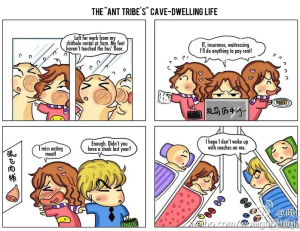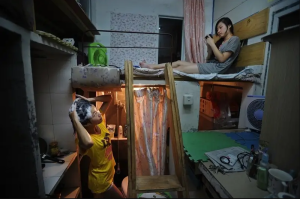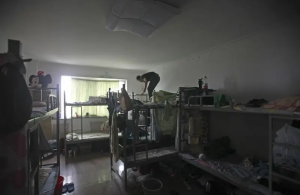1 Ant Tribe – 蚁族 (yǐzú)
Hannah R
simplified Chinese: 蚁族; pinyin: yǐzú
Ant Tribe
Refers to a group of low-income university graduates who settle for a poverty-level existence in the cities of China. An individual member of the tribe is referred to as an “ant.” Generally, the population has largely migrated from rural areas to cities and was born during and after the 1980s. Ant tribe has been used interchangeably with “rat people”; however, “rat people” is a term designated for older workers forced out of their above-ground apartments into underground rentals. In contrast, “ant people” are recent graduates in cramped quarters.
The post-doctoral researcher at Peking University, Lian Si, began research on the living conditions of college graduates after reading “The Down Youth,” an article that describes the difficult living conditions of college graduates born in the 1980s. Lian found a connection between the “stuck on the ground ants” and the struggling crowds of city-dwelling college graduates, hence the viral phrase “ant tribe”. These college graduates earn degrees in economics, engineering, management, and medicine, yet are stuck earning an average of $286 per month as reported by a survey conducted in 2010. Lian describes them this way: “They share every similarity with ants. They live in colonies in cramped areas. They’re intelligent and hardworking, yet anonymous and underpaid.” Regardless of their poor circumstances, the ant tribe is known best for their optimism. These young people choose to stay in crowded cities to maximize their career prospects. Their hope for better conditions drives them to accept starting-level positions for which they are overqualified.
Another aspect of the ant tribe is their lodging. To minimize living costs, young people with low-paying jobs tend to rent small rooms or shade a crowded and compact apartment space in the city slums. They make do with inadequate living conditions, such as little furniture or no air conditioning. Others suffer from no access to hot water or heating. In Beijing, an estimated 100,000 ants live in windowless underground hovels; others live in buses, shipping containers, and shockingly tiny bunk beds.
Examples
1.) A viral about the plight of China’s underemployed urban young living in very cramped quarters

2.) An employee of a mail delivery service showers under her bunk bed at her rental.

3.) A typical “ant tribe” living arrangement for recent college grads.

All images appear in Kevin Tang’s article “China’s ‘Ant Tribe’ Lives in the World’s Most Cramped Apartments.”
Citations
“China’s ‘Ant Tribe’ Still Struggling.” China’s ‘Ant Tribe’ Still Struggling – China.org.cn, China Daily, 14 Dec. 2010, http://www.china.org.cn/china/2010-12/14/content_21536966.htm.
Jou, Eric. “A Look into the Homes of China’s ‘Ant Tribe.’” Kotaku, Kotaku, 21 Aug. 2013, https://kotaku.com/a-look-into-the-homes-of-chinas-ant-tribe-1107163431.
Saunders, Doug. “Behind China’s Crisis, Consumers Driven Underground – Literally.” The Globe and Mail, The Globe and Mail, 21 Aug. 2015, https://www.theglobeandmail.com/news/world/the-ant-tribe-of-china/article26054666/.
Tang, Kevin. “China’s ‘Ant Tribe’ Lives in the World’s Most Cramped Apartments.” BuzzFeed News, BuzzFeed News, 27 Nov. 2013, https://www.buzzfeednews.com/article/kevintang/chinas-ant-tribe-lives-in-the-worlds-most-cramped-apartments.
simplified Chinese: 鼠族; pinyin: shǔzú
considered one of China's most prestigious institutions of higher education, and is known as the "Harvard of China"

